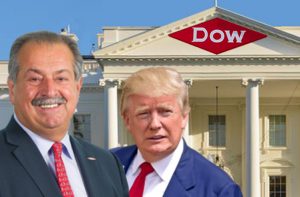
Donald Trump has nominated a Dow Chemical corporate lawyer to run the Environmental Protection Agency (EPA) office responsible for emergency response to hazardous spills and the clean-up of the most contaminated sites in the US.
If the Senate confirms his appointment, Peter C. Wright, who has worked as a corporate lawyer at Dow Chemical Co. since 1999, would serve as EPA’s assistant administrator for Land and Emergency Management.
Wright would oversee the EPA department which responds to large-scale national contamination emergences, including oil spills and unauthorized chemical or radioactive material releases, along with the Superfund hazardous waste clean-up program.
Dow Chemical merged with DuPont last year, creating the world’s largest chemical maker. The companies are also financially responsible for cleaning up toxic sites where they caused pollution and an analysis of EPA data by The Associated Press shows Dow and DuPont as responsible parties for over 100 of the toxic sites currently undergoing, or slated for, clean-up across the US.
In other swamp-draining news, Dow made a $1 million donation to Trump’s inaugural committee1; Dow spent $13.6million dollars on lobbying the US Federal Government in 2016 alone; in 20172, Dow asked US government agencies to ignore a US Government scientists’ study of the pesticide chlorpyrifos. Dow claimed that the studies were ‘fundamentally flawed’ and hired a bunch of scientists of its own who, unsurprisingly perhaps, came up with a set of different results3.
1: USA Today, Feb 17, 2017. Corporations gave millions to Donald Trump inauguration: https://www.usatoday.com/story/news/politics/2017/02/17/corporations-gave-millions-donald-trump-inauguration/98056554/
2: thehill.com ‘Who’s Lobbying Big’: http://thehill.com/business-a-lobbying/business-a-lobbying/318177-lobbyings-top-50-whos-spending-big
3: Dow Chemical Asks US Government Agencies to Ignore US Government Scientists’ Pesticide Study: https://www.bhopal.org/dow-chemical-asks-us-government-agencies-to-ignore-us-government-scientists-pesticide-study/


